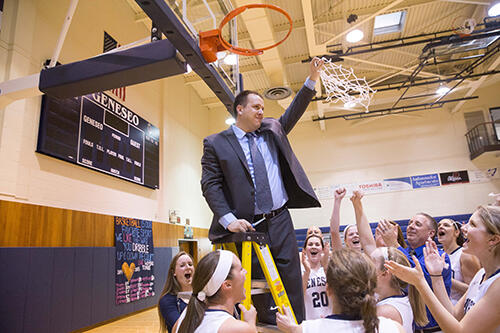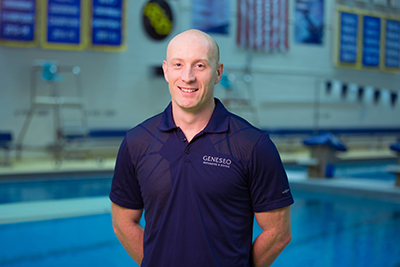
This article originally appeared in the Geneseo Scene magazine. Read it online here.
In the world of intercollegiate athletics, being voted the best at what you do by your peers is a unique honor. For coaches, being tabbed national coach of the year is recognition that only a handful achieve during their careers.
While only three coaches in the history of SUNY Geneseo athletics had ever received such recognition prior to the 2015-16 academic year, three were bestowed the honor last winter. As such, their experience and leadership, especially in times of adversity, offer valuable insight into how to motivate individuals and keep teams united to accomplish outstanding feats.
Shawn Austin
NCAA Division III Men’s Diving Coach of the Year
When Shawn Austin clocks out of his full-time job in the Computing and Information Technology office at Geneseo, he trades in his duties as a technology support specialist to patrol the deck at Alumni Pool as the Knights’ diving coach.
Last season, Austin guided Samuel Randall ‘18, through a season that culminated with a national title in 3-meter diving at the NCAA Championships as well as a third-place finish on the 1-meter board to bring home two All-America certificates.
“My philosophy, which pretty much starts from day-one with our divers, is for them be intentional, purposeful student-athletes,” explained Austin. “I want them to do everything as part of a process with a purpose. Regardless if it is conditioning, lifting, practicing or competing, don’t just do it –- do it with intention and meaning. If I can instill that early on, it makes a big difference and when I see it in our divers, it really motivates me as a coach.”
 Randall’s national title was the first in the history of the swimming and diving program, and was the first ever by a male student-athlete in any sport. Under Austin’s guidance, Randall also won NCAA Regional and SUNYAC titles.
Randall’s national title was the first in the history of the swimming and diving program, and was the first ever by a male student-athlete in any sport. Under Austin’s guidance, Randall also won NCAA Regional and SUNYAC titles.
“Sam is an exceptional athlete. While you really can’t teach a lot of what he has, he is an example of what I strive to get others to be. When Sam is at practice, he’s 100-percent at practice. He knows what is expected and does everything with a plan, which includes not only focusing on strengths, but working on weaknesses. He is motivated to do his best and is also not distracted by anything else going on in his world outside the pool.”
As a first-year, Randall finished 19th on the 3-meter board at the NCAA Championships. Noticing that he was comparing himself to all the other divers and focusing too much on how good he thought they were, Austin employed a different strategy a year later that was a big part of Randall’s dramatic jump to the top.
“What worked for him this past year was getting him not to think. At NCAA’s before each attempt, we’d spend a minute by ourselves going through the mechanics of each dive. He also didn’t watch the rest of the competition either. I told him he couldn’t control what anyone else was doing and could only take charge of what he was about to do. I think it worked out pretty well.”
Scott Hemer
Pat Summitt Trophy/United States Marine Corps/WBCA Division III National Coach of the Year
Scott Hemer has transformed the women’s basketball program into one of the best teams in the Northeast Region during his nine years at Geneseo. Last season, he guided the Knights to their fourth-consecutive SUNYAC Championship game appearance and a return trip to the NCAA Tournament a season after making a run to the Sweet 16. Geneseo finished with a 21-8 record for the team’s fifth 20-win season in the last six years.
“Success breeds success,” said Hemer. “There is now a level of expectation that our returning players place on themselves to be in a position, year in and year out, to compete for a SUNYAC Championship. That is as much a motivation as anything else. Once you get to that point, one of the biggest jobs of a head coach is finding ways to help your players to be successful from the inside and educate them on how to be good leaders. If you can accomplish this, they will set the standard and tone for others — to not only follow, but join in as leaders.”
Obviously having good players helps too, but finding the right combination of talent and intangibles is paramount when Hemer is on the recruiting trail.
 “When we recruit, I look for intelligent, self-driven student-athletes who are willing to be a part of something bigger than themselves. I also look for at least one of two qualities. They either communicate effectively or are one of the hardest working players on the team. If you can assemble a mixture of those players, or even throw in a couple that have both characteristics, you will be in a good position to succeed. Along those lines, if they are selfless, dedicated and buy into what you are trying to do as a program, you can go even farther. The parts melt together to form a strong leadership group.”
“When we recruit, I look for intelligent, self-driven student-athletes who are willing to be a part of something bigger than themselves. I also look for at least one of two qualities. They either communicate effectively or are one of the hardest working players on the team. If you can assemble a mixture of those players, or even throw in a couple that have both characteristics, you will be in a good position to succeed. Along those lines, if they are selfless, dedicated and buy into what you are trying to do as a program, you can go even farther. The parts melt together to form a strong leadership group.”
Even in the face of the trying times the team faces last season, the type of perseverance and character that was already in place on the team carried them forward together.
“I think the adversity we faced last season it is a testament to the type of players we recruit. They trusted in the coaching staff and, more than anything, were dedicated to each other. A culture like that can really help get you through a lot.”
Chris Schultz
AHCA Edward Jeremiah Award - Division III Co-National Coach of the Year
Last season, Chris Schultz ’97 guided the Geneseo men’s ice hockey team to its second NCAA Division III Tournament Semifinals appearance in the last three years. The Knights also won their first SUNYAC Championship in 10 years while compiling a 20-5-6 record for only the sixth 20-win season in the 41-year history of the squad.
“Our coaching staff teaches that achieving success takes time,” explained Schultz, who finished his 11th season behind the Knights’ bench. “If the players stay within the process and trust it, as long as we are doing our job and bringing in talent that complements what we are asking, winning usually follows.
 “We also consistently preach staying in the now and focusing only on our next opponent. The coaching staff will have a vision of what the next two weeks of a season may look like, but we restrict our players to staying in the moment and setting their sights on our next game.”
“We also consistently preach staying in the now and focusing only on our next opponent. The coaching staff will have a vision of what the next two weeks of a season may look like, but we restrict our players to staying in the moment and setting their sights on our next game.”
Schultz, who was also named the Jeremiah Award winner following Geneseo’s run to the 2014 national semifinals, knows that in a locker room typically filled with a wide array of talent and skill, motivation often times comes from within.
“I truly believe in empowering a leadership group to take control of the locker room and more importantly, own the culture. Our definition of our culture is to make sure that we all love each other in the locker room and put others’ needs ahead of their own. We preach humility and a high compete level. Our recent successes stem from great innate leadership that owns, controls, monitors, and evaluates our culture on a daily basis.
“Adversity is oftentimes the best motivator and, if our culture is perfect, is just an obstacle. Hard times are great because they usually bring out the best and worst in people. That’s when you can evaluate the mental toughness, character and resolve of your student-athletes.”
A direct correlation can often be drawn between teams that operate in that sort of culture and also find success. That type of team dynamic can also carry a team through extreme levels of hardship, as was illustrated last winter. "When you take a look back on what we dealt with, our players faced the most difficult adversity that they will hopefully ever see in their lives. The culture of our team enabled them to not only continue on with the season, but succeed at the highest level.”
— By Tim Volkmann, director of athletic communications